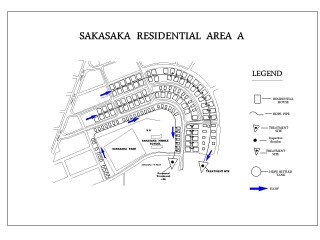Project Results:
The purpose of this project was an integrated sanitation intervention designed to provide complete sanitation services to households and also introduce a reuse programme for wastewater and sludge in urban agriculture production. The project offered a two-stream business opportunity to generate revenues from the installation of the infrastructure of the SFS, from household connections and service fees, and from the sale and distribution of nutrient-rich wastewater for irrigation and sludge for co-composting.
Key Results
- Sewer connections for 350 households and compounds (2750 people)
- Construction and maintenance of Solid Free Sewer Network
- Transportation of wastewater to the treatment plant built as part of the project.
- Renovated/constructed WWTP at Community Health Nursery Training School
- Wastewater treatment for agricultural use
- Provision of sludge for the production of compost
- Facilitation for provision of loans for household sanitation improvement
Tips for the future
- Defined roles for consultants & clear communication channels between lead partners and consultants
Potential for growth
The SFS network presents features for upscaling and replicability as a complete sanitation solution. As a decentralized system, it is easier to be replicated by the adaption of the terrain, characteristics and demand of any new project area. The general operational concept of the system has been disseminated among interested stakeholders and institutions through interviews and assessments in search of reliable and sustainable sanitation solutions.
The partner has also embarked on a funding plan both for completing the network as a short-term assignment by sending funding requests to the three Embassies for funding to continue the installation of the full network. Among the Embassies is the British High Commission under the bilateral funding arrangements.
Among other things, the partner has developed a feasibility study proposal to assess replication of its current work at a new Nursery College site and neighbourhood. These are submitted for consideration to the Ghana Health Service. They also plan on working on comprehensive marketing and communications plan to widen the scope of their clientele. The partner would like to focus on working with both public and private institutions to scale up the sewerage network and treatment facility.
Project partners
Perfect Sanitation Solutions, LeAF, GMB, Daily Business
Period
18 November 2016 - 31 December 2018
Location
Tamale, GhanaLast project updates
Background
Sanitation services are the responsibility of the Tamale metropolis. Previously, these services were the responsibility of the Ghana Water & Sewerage Corporation (now Ghana Water Company), but this service provision was neglected as the focus of the company was on drinking water delivery. The National Environmental Sanitation Policy (NESP, 2010) of Ghana mandates Municipalities to be responsible for the design, operation and management of wastewater systems. The decentralization of authority and responsibility of public services provision to local governments is an essential part of the overall governance reform and development strategy in Ghana. This is premised on the fact that decentralization will increase economic efficiency and allow greater differentiation in provision of public services due to improved preference matching and government accountability. The NESP seeks to develop, maintain a clean, safe and pleasant physical and natural environment in all human settlement.
Project Plan
The proposed project will design, implement, operate and maintain a decentralized settled sewer networks in the densely populated Sakasaka community occupying approximately 6000 square meters north-east (pilot area) of the Tamale Metropolis. The pilot project in will have an expansion capacity for up to approximately 500 households (3500 people) maintaining the operational level and increasing household connections by 50% within two year under the management of perfect sanitation solutions (in year one) and an established utility. This project seeks to capitalize on the non-existence of appropriate sewer network in Tamale, and will enhance the collection of wastewater generated at the pilot location, SakaSaka in order to make the waste water and sludge available for agriculture purposes.
Target group
The project customers will include but not limited to the households in Sakasaka area where the first phase (pilot) of the intervention is billed to take-off. Other well planned areas and institutions (schools and work places etc) would be targeted as well as potential customers. The project will ensure approximately 40% (base on demand) of the total households in Tamale.
Sustainability
The project management adopts an integrated approach to increase the value and use of all waste resources for increased economic for its sustainability. The approach includes; financial, Institutional, Environmental, Technical as well as social sustainability issues, such as;
-set up a Sanitation and Waste Utility
-maintain a sound environment by the reduction in soil and groundwater pollution
-simple and local knowledge and skills on operation and management
-provide security for both women and children who have the responsibility to dispose of human waste
Overview of Goals
Key outcomes expected in the project include;
- A functioning sewerage solution for Sakasaka is developed and in use, and service targets achieved by March, 2018.
- Institutionalized Sanitation and Waste Utility (SWU) and management framework in place by February, 2017.
- Business plan developed for investor arrangement in the expansion and scale-up of project by March, 2018.
Results and indicators
- OC1: A sewerage solution for Sakasaka A and B is developed and service targets achieved
- Provide a sewer connection for 350 households and compounds (2750 people) 350 ( target )
- number of households connected to small bored sewer system
- OC2: Institutionalized Sanitation and Waste Utility (SWU) and management framework in place.
- A SWU is established as a body for post project implementation management. 1 ( target )
- A representation of institutions and individuals to manage the WASH interventions in theMetropolis, 7 ( target )
- stakeholders represented
- OC3: A Business plan developed for investor arrangement in the expansion and scale-up of project.
- A marketable Business Plan with investment plan is prepared. 1 ( target )



